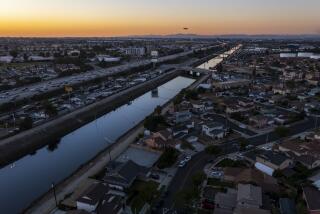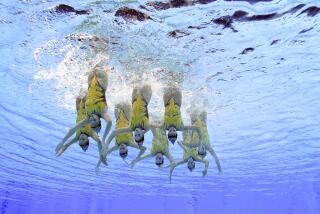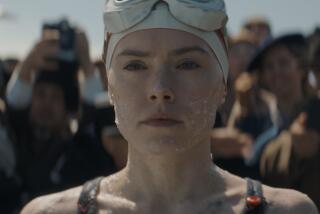McConica Joins List of English Channel Conquerors
- Share via
Next to drinking tea, swimming across the English Channel seems like the most popular activity in Great Britain.
Not a day goes by that someone is either swimming across the channel--22 miles wide at its narrowest point--or in training to cross it.
In fact, during the peak tourism months of July and August, it’s often easier to swim from England to France, or vice versa, than to wait for a boat. It might not be faster to swim, but it’s less crowded.
Crossing the channel has become so routine, it’s not even mentioned in the British newspapers anymore.
So if swimming the channel is so commonplace, what brings swimmers back to Dover, England, every year to attempt yet another crossing?
The challenge for one thing.
“It could well be the hardest swim in the world,” said Audrey Scott, secretary of the Channel Swimming Assn., of Kent, England, which has overseen all crossing attempts since 1927.
Jim McConica, 37, of Ventura, is all too familiar with the difficulty of a channel crossing. Five hours into his first attempt earlier this month, McConica asked his crew to take him out of the water.
“I was broken, mentally and physically,” McConica said. “I was all used up. I was feeling more pain than I’ve ever endured in my life.”
The 58-degree waters of the English Channel were getting to McConica. In addition to the cold, he also had to contend with strong currents and rough seas, muscle cramps and the jellyfish that litter the channel.
But the crew refused to let him quit, and McConica braved the elements and overcame his doubts to finish in 8 hours, 40 minutes and become the 328th swimmer in the last 113 years to cross the channel. His time was 13 hours faster than Matthew Webb, a captain in the British Navy, who recorded the first official crossing time of 21:45 in 1875.
After Webb, 36 swimmers braved the channel’s swift-moving waters before the next successful crossing was recorded in 1911.
Henry Sullivan, a countryman of McConica’s, has the dubious distinction of recording the slowest crossing time (26:50) in 1923.
Michael Read, of Ipswich, England, never seemed to get his fill of crossing the channel. He holds the record for the most crossings (31), while Cynthia Nicholas of Canada has the women’s mark (19).
Like most who cross the channel, McConica is a veteran distance swimmer. After leading Buena High to a Southern Section swimming championship in 1969, McConica was on the USC swim team for four years.
He defeated Olympic gold medalist Mark Spitz in the 200-yard freestyle at the 1971 NCAA Collegiate Championships. McConica watched Spitz at the ’72 Olympics in Munich, West Germany, as a spectator, however, after failing to qualify for the U. S. team.
After college, McConica sought new challenges. He found them in distance swimming and started competing in triathlons and racing from Catalina Island to the mainland.
McConica knew, however, that the ultimate test for any distance swimmer was crossing the English Channel. He trained for a year in the ocean near Ventura before he was ready for his attempt.
But even after a year of training, McConica still wasn’t sure if he was completely ready.
“I had plenty of people who thought I was crazy,” McConica said. “I’m supposed to be a mature adult and then I go off to swim in 58-degree water in England.”
McConica chose to ignore his friends’ concerns in order to find out if he still had the competitive edge of his high school and college days.
“I’m fairly old and I wanted to see if I still had the mental and physical toughness that I used to have,” McConica said.
McConica’s wife, Dona, never doubted her husband’s drive, however. “He’s the most determined, self-disciplined person I know,” she said. “It surprised me when he wanted out after five hours.”
While more than twice as many men than women have crossed the channel, Penny Dean of Riverside holds the record for the fastest crossing (7:40), set in 1978. Dean also set the record (8:33) for swimming from Catalina to the mainland in 1977 and held it until McConica broke it six years later with a time of 8:27.
McConica didn’t expect to break Dean’s channel record, but he came close. At the 6-hour point, McConica was only three miles away from the Northern coast of France and Dean’s record was within reach.
The southward currents weren’t cooperating with McConica’s record attempt, however. They pushed him more than a mile off-course, adding about 20 minutes to his time.
It took McConica nearly three hours to complete the final three miles, ruining any chance at a record. He crawled to shore about 1,500 yards north of his finishing point--Cap Gris Nez, on the northern coast of France--and waited for his crew to pick him up for the return trip to England.
An official from the Channel Swimming Assn., joined McConica’s crew to make sure no rules had been broken and to authenticate his time.
Another function of the CSA is to oversee a swimmer’s attire during a channel crossing. According to the official CSA information packet, a swimmer is only allowed to wear a non-rubberized swimsuit, goggles and a bathing cap.
The CSA also regulates the kind of grease that the swimmer can use to protect against the cold water. It recommends a petroleum-based grease manufactured in England.
As secretary of the CSA, Audrey Scott is responsible for compiling all relevant data and trivia associated with channel crossings. She can tell you who were the oldest and youngest swimmers to cross the channel, as well as the most popular month and day of the week for crossings.
About the only thing that Scott isn’t sure of is why swimmers never tire of making the grueling, arduous channel crossing.
“You’ve got jelly fish, very cold water and the tides can be rough on you,” Scott said. “And, of course, the saltwater makes the swimmers sick. But they still come back and try again.”
Like most swimmers, McConica made the crossing for personal reasons. “It was a challenge and I’m somebody who loves to compete,” he said.
More to Read
Sign up for Essential California
The most important California stories and recommendations in your inbox every morning.
You may occasionally receive promotional content from the Los Angeles Times.













